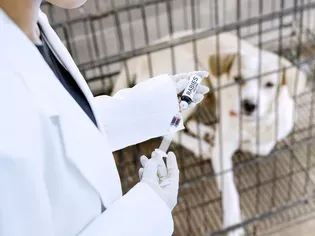Pet Rabies Shots and How Long They Last
Updated on 04/26/24

Protecting Your Furry Friend: A Comprehensive Guide to Pet Rabies Shots and Their Duration
In the realm of pet ownership, the well-being and safety of our furry companions reign supreme. Among the crucial measures we can take to ensure their health is vaccination against rabies, a potentially fatal viral infection. Understanding the importance and duration of rabies shots for pets is essential for responsible pet care.
Rabies: A Deadly Threat to Pets and Humans
Rabies is a zoonotic disease, meaning it can be transmitted from animals to humans. It affects the central nervous system, causing a range of symptoms, including aggression, disorientation, and paralysis. Rabies is almost always fatal once symptoms appear.
In the United States, raccoons, skunks, and bats are the primary reservoirs of rabies. However, any mammal can potentially contract the virus if bitten by an infected animal.
The Importance of Rabies Shots for Pets
Rabies vaccination is a cornerstone of preventive veterinary medicine. Vaccinating your pet protects them from the deadly virus and also plays a vital role in protecting public health by reducing the risk of rabies transmission to humans.
How Long Do Rabies Shots Last?
The duration of rabies protection offered by vaccines varies depending on the type of vaccine used. There are two main types of rabies vaccines for pets:
* Killed Virus Vaccines: These vaccines contain inactivated rabies virus and typically provide protection for 1-3 years.
* Modified Live Virus Vaccines: These vaccines contain a weakened strain of live rabies virus and provide longer protection, usually 3-5 years or longer.
Factors Influencing Vaccine Duration
Several factors can affect the duration of rabies protection, including:
* Pet's Age: Younger pets may have a shorter duration of protection.
* Pet's Health Status: Compromised immune systems can diminish vaccine effectiveness.
* Vaccine Type: As mentioned above, different types of vaccines offer varying protection durations.
* Environmental Factors: Exposure to harsh conditions or certain chemicals can shorten the vaccine's duration.
Monitoring Rabies Protection
To ensure continuous protection against rabies, regular monitoring and booster vaccinations are crucial. Your veterinarian will recommend an appropriate vaccination schedule based on your pet's individual needs.
Examples of Booster Vaccinations
* Killed Virus Vaccine: Booster every 1-3 years
* Modified Live Virus Vaccine: Booster every 3-5 years or longer
* Specific Recommendations for Various Pets:
Dogs: Every 3 years or as recommended by your veterinarian.
Cats: Every 3 years or as recommended by your veterinarian.
Ferrets: Every year
Rabbits: Every 6 months
Horses: Every 1-3 years
Additional Tips for Rabies Prevention
In addition to vaccination, there are other measures you can take to minimize the risk of rabies exposure in your pet:
* Keep pets confined to your property or on a leash when outdoors.
* Supervise pets when they are in contact with wildlife.
* Avoid feeding pets raw meat or unpasteurized milk.
* Report any wildlife sightings or encounters, especially those involving sick or aggressive animals.
Conclusion
Rabies shots are a vital investment in your pet's health and safety, as well as your own. By understanding the importance, duration, and factors influencing rabies protection, you can ensure that your furry companion remains safe from this deadly disease. Regular monitoring and booster vaccinations are essential to maintain continuous protection. Remember, prevention is always better than cure, and vaccinating your pet against rabies is the ultimate act of responsible pet ownership.
Explore More Pets

Cat Behavior Problems
How to Stop Aggression in Kittens

Long-Haired Cat Breeds
Siberian Cat: Breed Profile, Characteristics, & Care

Cat Behavior Problems
How to Stop Kittens From Scratching and Biting

Long-Haired Cat Breeds
Turkish Angora: Cat Breed Profile, Characteristics & Care

Basic Training
How to Socialize Your Kitten

Short-Haired Cat Breeds
Cute Pictures & Facts About Calico Cats & Kittens

Litter Box Training
Training Your Kitten to Use the Litter Box

Long-Haired Cat Breeds
10 Fun Facts About White Cats